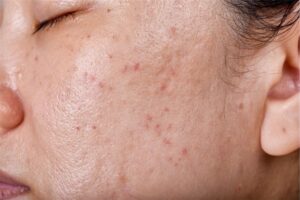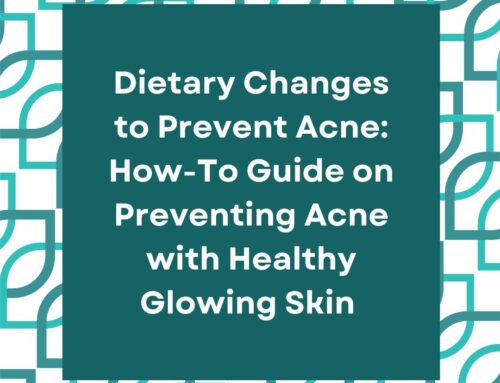Dry Skin vs Oil vs Combination Skin
Understanding your skin type is essential for crafting an optimal skincare regimen to maintain the health of your skin. To do so, you must determine if you have dry or oily skin, or perhaps a combination of both. In this post, we are going to discuss how your skin type affects your likelihood of developing common skin conditions, such as acne and eczema, and what routine is best suited for that particular skin type.
Dry Skin
Dry skin is caused by insufficient oil production and moisture, leading to tightness and flakiness of the skin. Usually, these deficiencies are caused by a defective skin barrier, which plays an essential physical and biochemical role in blocking out harmful pathogens and trapping moisture in the skin. Because the protective function of the skin is compromised, this allows bacteria and allergens to invade the skin, which can cause conditions, such as acne and eczema.
Here are some tips to take care of your dry skin:
- Use lukewarm water to rinse your face. Using hot water, as most people do, can strip even more oil from your skin and dry it even more.
- Avoid products that contain fragrance, alcohol, retinoids, or acids. These ingredients have sebostatic properties (remove or stop oil production).
- Avoid washing your face too frequently. This will differ for everyone but washing too frequently can remove even more oil from your skin and also vital antimicrobials that prevent skin infection.
- After taking a shower or washing your face, lightly dab your skin with a towel as opposed to rubbing your skin.
- Regularly apply a thick, emollient cream to trap the moisture in your skin. You can even apply it overnight and use saran wrap to occlude the areas to help the cream absorb deeper and faster.
- Use a humidifier to artificially add moisture to the air.
- Drink plenty of water to keep your skin hydrated.
- Try to stay out of the sun during peak hours and regularly apply sunscreen, as those with dry skin tend to get sunburned more easily.
Many people often ask which cream they should use for their skin. The only product we endorse is Aveeno Eczema Therapy. However, we find that most patients know their skin best and can find a cream that works best for them.
Oily Skin
Oily skin is caused by excessive production of sebum in the skin. Oily skin types are often associated with acne, blackheads, and enlarged pores.
When it comes to skincare, many patients think that washing their face more often and more intensely is healthy for their skin. In actuality, overwashing the face can cause the skin to produce even more oil. This is because your skin is trying to overcompensate for all the oil that you quickly remove by using too much face wash or scrubbing.
Other tips that you should keep in mind:
- Try to use lightweight, non-oily facial products.
- Apply an exfoliating mask to remove dead skin and excess oil. Only perform this once or twice a week; otherwise, this could irritate your face and cause even more oil production.
- Use oil-absorbing sheets to control the amount of oil sitting on your skin.
- Consider applying sebostatic topical agents, such as retinoids or alpha-hydroxy acids, every night.
- Take a high-dose Vitamin A supplement (consult with your dermatologist first).
Combination Skin
Most patients have a combination of dry and oily skin. For these patients, oily skin may be concentrated in the T-zone, consisting of the forehead and nose. In these cases, we would simply advise that patients follow the same general tips that we mentioned for both dry and oily skin.
However, an additional tip we would recommend specifically for combination skin types include using spot treatment with products containing benzoyl peroxide or salicylic acid to treat individual acne breakouts in oily parts of the face.
But what is the best way to wash your face?
Nowadays, you’ll see a bunch of information online about the best 12-step skincare routine with all the fancy branded products.
What we tell patients is for them to run shampoo water down their face in the shower – that’s it.
Our skin has natural lipids, antimicrobial peptides, and other biochemical properties that are vital for overall skin health. Your skin was not meant to be excessively washed with soap and other artificial facial products, although you may feel good about yourself when you do so.
Of course, everyone is different and some may require more steps in their face wash routine than others. But it is always wise to start with the bare essentials before moving onto other skin products because less is more at the end of the day.
How does skin type affect acne and acne scarring?
Most people believe that it is oily skin that increases the risk for developing acne. While it is true that excessive oil production can lead to acne, people with dry skin can also suffer from acne.
This is because dry skin can often be more susceptible to bacterial infections, specifically Propionibacterium acne (P. acne). Therefore, it is important not to discount an effective anti-acne skincare routine for patients with dry skin.
When it comes to scarring, dry skin can be problematic because it lacks the moisture and elasticity for optimal healing. Both of these characteristics can increase the risk for scarring and delay response to scarring treatment.
Patients with oily skin can also have a much greater risk for scarring. This is because they are particularly prone to acne, which can lead to disfiguring scars. Additionally, the risk for repeated breakouts after scar treatment can delay healing or even cause additional scarring.
In order to prevent these issues from happening, it is important to discuss with your dermatologist about how to tailor your skincare routine.

Acne Scar Healing at Scar Healing Institute
Final words…
Every patient has a unique skin profile. Understanding how to take care of your skin based on your skin type can help you maintain the health of your skin and prevent common skin conditions, such as acne. At the Scar Healing Institute, we will work with you to develop a tailored skincare routine with the right skincare products and treatments to give your skin a healthier and more radiant appearance.
Schedule an Appointment
Scar Healing Institute
Scar Healing Institute is committed to developing the most effective treatments for scarring. Our team of scar revision specialists are continually inventing the latest technologies and formulas to deliver the best results for our patients.




